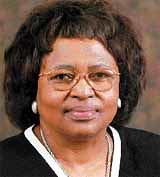
Dr. Manto Tshabalala-Msimang, the South African Minister of Health. The press has speculated that the departure of the deputy minister in part resulted from a conflict over policy.
Originally uploaded by Pan-African News Wire File Photos
MIDWIVES CRITICISE GOVERNMENT'S PLAN
Government's plan to qualify midwives after two years was on Tuesday criticised by the Society of Midwives of SA.
The society's president, Deliwe Nyathikazi, told delegates at the start of the society’s 7th Annual Congress being held at the International Convention Centre in Durban that there were concerns at "new initiatives to downscale midwifery."
"The shortage of midwives has a severe impact on the health system. We need more trained midwives."
She said the government's "downscaling" of the training period would have a negative impact on the quality of care provided to pregnant mothers and also their new born offspring.
Currently, a period of four years was needed to earn a midwife's certificate, while the government was considering that the certificate be issued after two years of training.
"Without competent midwives, the future of mankind is threatened," said Nyathikazi.
She also said that the health department did not recognise the role of midwives, especially in primary health care clinics.
"We request minister that you further assist and promote the
practice of using midwives," she said.
However, Manto Tshabalala-Msimang said: "I don't think you should doubt the commitment to support midwives."
At a press conference afterwards, the minister said that attempts to have midwives operating after two years was not an attempt to minimise the role of midwives, but that the department had a made "principled decision to train mid-level health professionals" who would "release professional nurses from doing menial jobs".
Globally, an estimated 500,000 women die during child birth.
Tshabalala-Msimang pointed out that one in 16 women in Africa on average died during a pregnancy, or during child birth.
In the developed world she said the figure was one in 2,800 women.
She said that the government needed to "increase its social spend" so that education, clean water and poor sanitation become less of a contributing factor in maternal mortality.
She said the department was trying to address the shortage of nurses by recruiting overseas, drawing back South African nurses who had previously emigrated to the UK and rehiring retired nurses.
Referring to the recent outbreak of klebsiella at Durban's Prince Mshiyeni Memorial Hospital, she praised staff at the hospital for their speedy response in identifying the problem.
"In the main, it depends on each and every one of us. Our own
conscience must say we are here to protect mothers and their babies."
Asked if reducing the qualifying time of midwives would increase the risk of a failure in infection control measures, she said the training of the mid-level nurses " must be appropriate".
She urged the society to consult with the SA Nursing Council on the planned changes midwifery qualifications, which had not been finalised.
Speaking about her recent liver transplant, she said: "I am now strong on my feet and working once again. The liver is intact and functioning properly."
JOHANNESBURG 11 December 2007 Sapa
HEALTH COUNCIL LEAVES TARIFFS UNCHANGED
The Health Professions Council of SA (HPCSA) has decided to leave its ethical tariffs, the fees it recommends health professionals should charge, unchanged for 2008.
"Given the fact that the ethical tariff factor is already much higher than the National Health Reference Pricing List (NHRPL), it has not been considered necessary to inflation-adjust it, " said HPCSA registrar Boyce Mkhize on Tuesday.
The HPCSA was currently evaluating its tariff processes and how the NHRPL process would impact on this in the future.
Charges by practitioners above the rate at which medical schemes were prepared to reimburse their claims had to be done with the patient's informed consent.
Any charge up to and possibly exceeding the council's ethical tariff had to be negotiated and agreed upon with the patient, said Mkhize.
PRETORIA 11 December 2007 Sapa
FOOD FORTIFICATION TO BE MONITORED
A memorandum of understanding has been developed between the Health Department and the SA Bureau of Standards to monitor compliance and stability of food fortification mixes.
This was announced by Health Minister Manto Tshabalala-Msimang in Pretoria on Tuesday.
One of the challenges in the sector was that laboratories
responsible for testing fortified food samples were overburdened with other testing responsibilities, the minister said.
"Having identified these challenges, a memorandum of understanding has been developed with the SABS (SA Bureau of Standards) to monitor compliance and stability of the fortification mixes," she said.
Food fortification was important as it helped the department deal with nutritional challenges facing the country.
A programme called the SA National Food Fortification programme was launched in 2003 and developed by the milling and baking industry , consumer organisations and professional food and nutrition associations.
Since the start of the programme, supported by the Global Alliance for Improved Nutrition, the United Nations Children's Fund and the Micronutrient Initiative, more than 80 percent of women and 85 percent of children had sufficient iodine levels while almost 77 percent of households had access to iodated salt.
"This is indicative of the fact that the country has the potential to deal with micro-nutrient deficiencies".
Tshabalala-Msimang said that assistance would be given to people -particularly small and emerging millers - who were involved in the actual fortification.
"To that effect, a once-off subsidy grant of R23 million has been made available by government to assist millers to procure appropriate equipment".
She said the payment of the grant was "at an advanced stage and should resume before the end of the 2007/08 financial year".
No comments:
Post a Comment